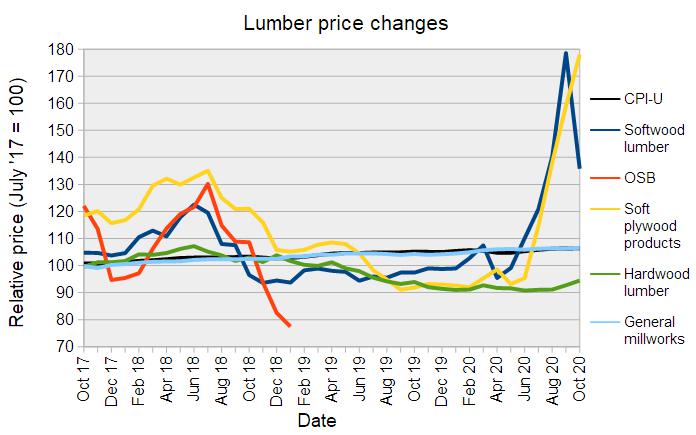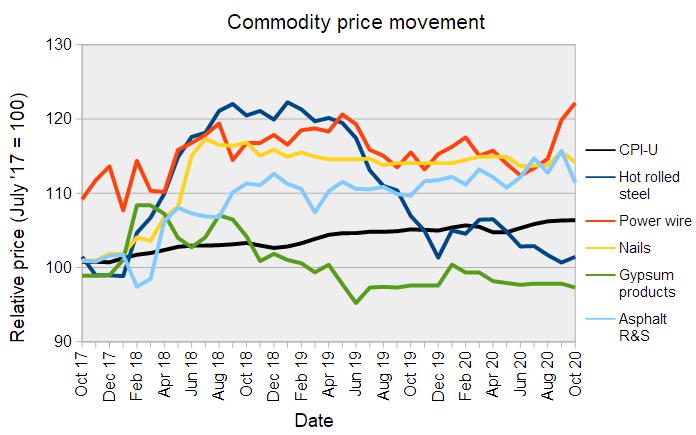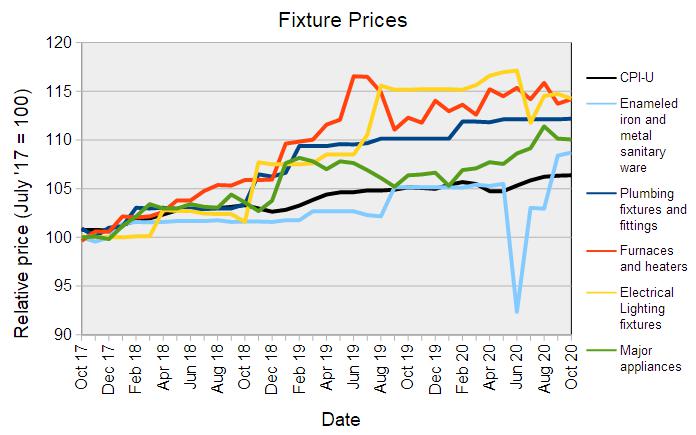By Michael Rudy – The Bureau of Labor Statistics (BLS) released its producer price index report for October 2020. It showed that the BLS index of construction materials prices was up 0.2 percent from September, seasonally adjusted. It was 4.8 percent higher than its year-earlier level.
By contrast, overall prices for processed goods for intermediate demand rose by 0.3 percent. Excluding food and energy, the price index for processed goods for intermediate demand was up by 0.2 percent for the month, as a rise in food prices was offset by a fall in energy prices. The full index was 1.5 percent lower than its year-ago level, reversing last month’s gain.
For reference, the changes in these indices compare with a 1.2 percent rise in the all-items consumer price index (CPI-U) for the 12 months ending in October. The CPI-U was unchanged for the month.
Yield Pro (PRO) compiled the BLS reported price changes for our standard list of construction commodities. These are commodities whose prices directly impact the cost of constructing an apartment building. The two right hand columns of the table provide the percent change in the price of the commodity from a year earlier (12 Mo PC Change) and the percent change in price from September 2020 (1 Mo PC Change). If no price data is available for a given commodity, the change is listed as N/A.
| Commodity | 12 Mo PC Change | 1 Mo PC Change |
| Softwood lumber | 68.7 | -8.0 |
| Hardwood lumber | 1.3 | 1.9 |
| General millworks | 2.2 | 0.3 |
| Soft plywood products | 45.6 | 9.0 |
| Hot rolled steel bars, plates and structural shapes | -5.4 | 0.8 |
| Copper wire and cable | 6.1 | -1.3 |
| Power wire and cable | 5.6 | 1.9 |
| Builder’s hardware | 2.0 | 0.1 |
| Plumbing fixtures and fittings | 1.9 | 0.1 |
| Enameled iron and metal sanitary ware | 3.5 | 0.3 |
| Furnaces and heaters | 2.3 | 0.4 |
| Sheet metal products | -0.2 | 0.1 |
| Electrical Lighting fixtures | -0.8 | -0.4 |
| Nails | 0.1 | -1.2 |
| Major appliances | 2.7 | -0.1 |
| Flat glass | -0.3 | 0.1 |
| Ready mix concrete | 2.0 | -0.9 |
| Asphalt roofing and siding | 1.7 | -3.7 |
| Gypsum products | -0.3 | -0.5 |
| Mineral wool insulation | 0.2 | 0.2 |
The summertime surge in softwood lumber prices has seemingly crested, with this month’s data showing a welcome drop in prices. However, prices for plywood products are up again this month. While the table above indicates that the price of softwood lumber has risen more than that of soft plywood products over the past 12 months, this is partly because the prices of soft plywood products were relatively higher than those of softwood lumber a year ago. When compared to April 2020 prices, October prices for softwood lumber were up 42 percent while plywood prices were up 81 percent. Looking ahead, lumber futures prices are well off of their September highs but they seemed to have settled at a level approximately 50 percent above price levels early in the year.
Prices of other wood products that we track have been relatively stable. This is shown in the first chart, below.

The second chart, below, shows the recent price history of several other construction materials. The story here is the rise in the price of power wire, which is being driven by the price of copper. The price of copper fell by as much as 25 percent from January to its low point in March. It has risen significantly since then and is now trading more than 10 percent above its January level.
The price of asphalt roofing and siding, which had been on an upward trend, took a step back this month. The prices of most other commodities tracked in this chart have been relatively stable despite the market disruptions caused by COVID-19.

Price changes for several of the more finished goods from our sample are illustrated in the final chart, below. The prices of these items seem to be continuing their recent trend of growing at a rate that is slightly above the general rate of inflation in the economy

Vietnam Plywood
Vietnam Film Faced Plywood



